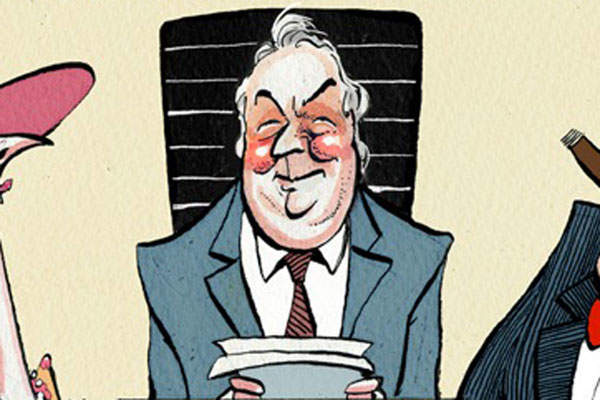

A handful of individuals have abandoned careers on Wall Street or in the City of London and become successful writers about the world of finance.
Michael Lewis wrote his 1988 classic Liar’s Poker about his brief stint (fewer than three years) as a Wall Street bond-trader at Salomon Brothers, the first of a string of bestsellers. After seventeen years as an investment banker, William D Cohan published TheLast Tycoons, about his old employer Lazard Frères, in 2007, and has since written books about Bear Stearns and Goldman Sachs.
Martin Vander Weyer quit a fifteen-year career as a merchant banker in 1992 — or perhaps it’s more accurate to say that it quit him — and has since done what he had always wanted to do, which was to write regularly for the Spectator, a magazine he had long adored, as well as occasional book reviews for Spear’s. He too wrote a book about a former employer, Fallen Eagle, in his case BZW, the investment banking division of Barclays that came out of Big Bang.
Vander Weyer is only the third business columnist in the Spectator’s history, following Nicholas Davenport and Christopher Fildes. His column ‘Any Other Business’ is about business in the wider sense — not just the ‘sexy’ world of finance, but also industrial enterprise, international trade and government policy towards business. There is no more of the dismal science of economics than is strictly necessary, no pontifical ruminations asking whither the euro or post-endogenous growth theory.
Instead, Vander Weyer prefers to write about the big beasts of the business jungle and the vainglorious nature of most financial fads, including those he once made a living from selling to unsuspecting investors in foreign climes. Also featuring prominently in his column are reflections about international travel, his life as a country gentleman, his beloved Yorkshire, where he is the
squire of Helmsley Hall, and even his exploits in the world of amateur dramatics.
In this book, collection of pieces from his Spectator column and from other publications, Vander Weyer offers a cornucopia of skewering insights, chortlesome anecdotes and bonhomous wit, all laced with his characteristic self-deprecation. It is often said that self-deprecation is a typically English trait; few Englishmen embrace it with as much gusto as he does.
In an item reminding us about former Bank of England governor Mervyn King’s previous career as an academic economist, Vander Weyer recalls being invited to two lunches à deux with King. At the first he let King do all the talking and little eating; at the second he took the initiative and gave the governor the benefit of his views about the global monetary situation. ‘The governor gradually emptied his bowl — mission accomplished, I felt — while regarding me through his spectacles with the same mildly puzzled look that my Oxford tutor used to assume, as if to say “Why on earth did we let this boy into the college?” A third invitation has not been forthcoming.’
The son of an old-school banking executive at Barclays, Vander Weyer’s first job was as a £54-a-week graduate trainee at Schroder Wagg in 1976, one of the merchant banks known as accepting houses. ‘What is a merchant banker anyway,’ he asks, ‘apart from a man who avoids rhyming slang?’ He describes himself as belonging to ‘the rearguard of the City’s gentleman amateur past’.
He recalls pricing syndicated loans to Brazil and Mexico (loans that ultimately had to be written off), advising that local authority interest swaps were legal (until the courts said otherwise), pushing cross-border mergers and acquisitions to the Japanese and recommending privatisations to ministers of liberated Eastern European countries.
‘I spent an exhilarating night on a London trading floor selling many millions of dollars’ worth of paper called Perpetual Floating Rate Notes to investors in Japan,’ he recalls. ‘Now, thanks to obscure changes in international regulations on bank capital, they will show a substantial loss on them forever.’
In 1987 he was sent out to Hong Kong as BZW’s local managing director, a title ‘handed out liberally in such firms, but rarely involving management or direction’.
Vander Weyer is a master of the arresting turn of phrase. When inveterate Wall Street dealmaker Bruce Wasserstein died in 2009, Vander Weyer pictured him in his own form of hell: ‘So it must irk him, from the place he now occupies — I’m picturing somewhere rather like a crowded Dubai nightclub with locked doors, no air-conditioning and no BlackBerry signal — that there are so many fat fees he can no longer collect.’
When Vander Weyer came ‘to encash the phantom options’ he received from BZW, it was ‘like coming out of your bunker after the bomb to find the banknotes of some obliterated state wafting in the nuclear wind’. On the Milibands, he has this to say: ‘I’m afraid, despite all the efforts of their spin teams, both brothers look to me like the work of a Doctor Who scriptwriter’. And this on his favourite hobby: ‘Am-dram is probably the most fun you can have without committing adultery, but that doesn’t mean that you can’t actually do the deed as well.’
One theme which emerges powerfully is that the world of finance is rife with what Warren Buffett, in referring to derivatives, called ‘financial weapons of mass destruction’. Best avoided by investors, they nonetheless are grist to the mill of a writer who savours la comédie humaine.








